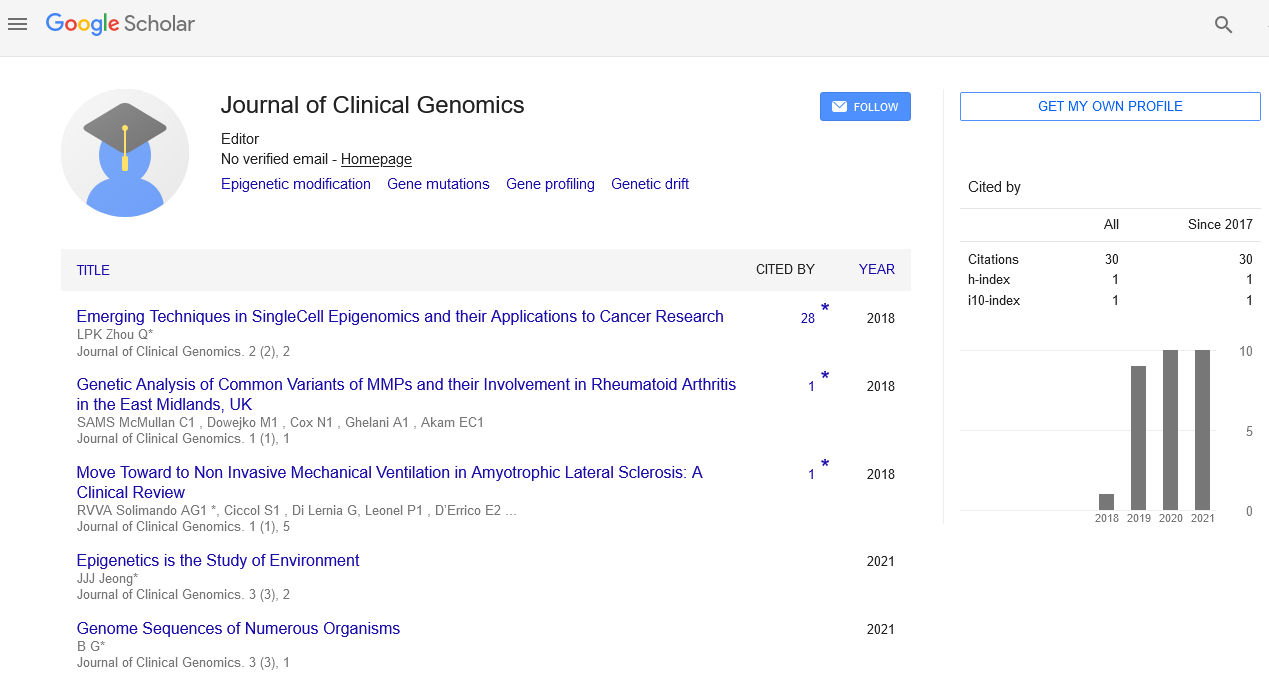Perspective, J Clin Genom Vol: 5 Issue: 3
Genomic Data Privacy and Ethics in Clinical Genomics: Current Challenges and Future Solutions
Sherya Tharehja*
1Department of Animal Genetics, University of Maryland School of Medicine, Izatnagar, India
*Corresponding Author: Sherya Tharehja,
Department of Animal Genetics,
University of Maryland School of Medicine, Izatnagar, India
E-mail: Tharehjas92@gmail.com
Received date: 02 September, 2023, Manuscript No. JCG-23-116283;
Editor assigned date: 04 September, 2023, PreQC No. JCG-23-116283(PQ);
Reviewed date: 18 September, 2023, QC No. JCG-23-116283;
Revised date: 25 September, 2023, Manuscript No. JCG-23-116283(R);
Published date: 05 October, 2023, DOI: 10.4172/JCG.1000137.
Citation: Tharehja S (2023) Genomic Data Privacy and Ethics in Clinical Genomics: Current Challenges and Future Solutions. J Clin Genom 5:3.
Description
The integration of genomic data into clinical practice brings immense promise but also raises profound ethical and privacy concerns. Clinical genomics has ushered in a new era of personalized medicine, offering valuable insights into an individual's genetic makeup for improved diagnostics and treatments. However, the use of genomic data in healthcare raises significant ethical and privacy considerations.
Challenges in genomic data privacy
Data security and breaches: One of the foremost concerns is the security of genomic data. Breaches can have severe consequences, as genetic information is highly sensitive and can be exploited for identity theft, discrimination, or even blackmail.
Informed consent and data sharing: Obtaining informed consent for genetic testing can be challenging due to the complexity of genomic data and the potential long-term implications. Additionally, data sharing for research purposes must strike a balance between advancing science and protecting patient privacy.
Genetic discrimination: The risk of genetic discrimination in employment, insurance, and social contexts remains a significant ethical concern. Patients may fear that their genomic information could be used against them, leading to reluctance to undergo testing.
De-identification challenges
Traditional de-identification methods may not be sufficient to protect genomic data, as it can be re-identified through familial genetic matches or combined with other publicly available data.
Determining who owns and controls genomic data—patients, healthcare providers, or research institutions—remains an unresolved issue.
Current approaches to address privacy and ethics
HIPAA regulations: In the United States, the Health Insurance Portability and Accountability Act (HIPAA) provides some protectionfor genomic data by classifying it as protected health information (PHI). However, the scope of HIPAA does not cover all aspects of genetic privacy.
Genetic Information Non-Discrimination Act (GINA): GINA prohibits genetic discrimination in employment and health insurance. However, it does not provide comprehensive protection against all forms of genetic discrimination.
Data encryption and access control: Healthcare organizations use encryption and strict access control measures to safeguard genomic data. However, these measures are not foolproof, and data breaches can still occur.
Robust data encryption and blockchain technology: Implementing stronger encryption and blockchain technology can enhance the security of genomic data, making it more challenging for unauthorized access and breaches.
Differential privacy: Differential privacy techniques add noise to genomic data to protect individual identities while still enabling valuable research insights. Widespread adoption of these methods could mitigate re-identification risks.
Federated learning and decentralized data sharing: Federated learning allows data to remain at its source, with algorithms trained across multiple distributed datasets without centralized data storage. This approach maintains data privacy while enabling collaborative research.
Genetic data banks and ownership frameworks
Developing genetic data banks with clear ownership and control frameworks can ensure that patients have a say in how their data is used and shared, fostering trust and participation.
Public awareness and education
Increasing public awareness and education about genomic data privacy, informed consent, and the benefits of genomics can help mitigate fears and encourage participation.
Conclusion
As clinical genomics continues to advance, addressing the ethical and privacy challenges associated with genomic data is imperative. Striking a balance between reaping the benefits of genomics and safeguarding individual privacy is a complex task that requires ongoing collaboration among stakeholders.
The solutions proposed here, such as robust data encryption, blockchain technology, and differential privacy, offer promising avenues to protect genomic data. Additionally, adopting federated learning and decentralized data sharing models can advance research while preserving privacy.
Ultimately, public awareness and education are vital components of this process. Ensuring that individuals understand the importance of genomic data privacy and how their data is used will foster trust and participation, ultimately contributing to the responsible and ethical integration of genomics into clinical practice.
 Spanish
Spanish  Chinese
Chinese  Russian
Russian  German
German  French
French  Japanese
Japanese  Portuguese
Portuguese  Hindi
Hindi 